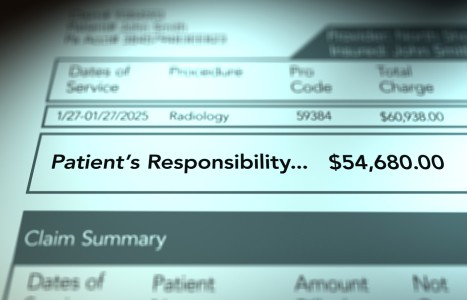Recent laws in New Jersey and California represent a disturbing trend that will negatively impact a practice’s ability to collect monies from patients, as well as expose them to significant penalties if the practice does not follow the mandatory guidelines to a T. Please be aware that a similar law may be coming to your state. The time to act is before the law is passed.
House Approves Chiropractic Care to Veterans in All VA Medical Centers
The Department of Veterans' Affairs (DVA) has been dragging its feet for a number of years on incorporating chiropractic within its medical centers. On Oct. 16, 2001, the 31-member House Veterans' Affairs Committee, chaired by Christopher Smith (R-NJ), acted. It approved, with only one dissenting vote, legislation (H.R. 2792) to mandate chiropractic benefits in the Department of Veterans Affairs (DVA), and placed it on the House calendar for consideration.
As we went to press, that was the front-page story. The hope was that the bill would come before the House within a few weeks, but nobody in chiropractic was counting on it, including us. With the turmoil of the aftermath of the September attacks, our feeling was the House had other agendas. Still, the thought crossed our minds that as the focus of the bill was on benefits to veterans, and our military forces and resources have been activated for a long commitment, the House might be favorably disposed to the bill.
Literally minutes before we shipped this issue to the printer, the word came. At 3:32 EST, the House passed the bill by voice vote. We were truly surprised, and immediately revised this article.
The chiropractic section of the bill is under Title II of the "Disabled Veterans Service Dog and Health Care Improvement Act of 2001." The original bill sought to expand the DVA's authority to provide guide dogs to blind veterans. The bill was expanded to include Title II (the chiropractic program) and Title III (a national commission on VA nursing).
The chiropractic section of the bill calls for:
- a permanent chiropractic benefit available through all DVA medical centers;
- allowing veterans to select doctors of chiropractic as primary care providers;
- a veteran with a primary care provider other than a chiropractor may be referred to chiropractic services for neuromusculoskeletal conditions by a medical provider;
- a scope of chiropractic services that would "include, at a minimum, care for neuromusculoskeletal conditions";
- DCs working under personal service contracts at the DVA medical centers;
- the establishment of an advisory committee (to include chiropractic representatives) to develop and implement the chiropractic program; and
- the secretary of DVA to provide training and chiropractic materials to educate other health care providers on the benefits and use of chiropractic services.
The program calls to integrate chiropractic into the DVA medical centers under this timetable:
- not less than 30 medical centers by the end of fiscal year 2002.
- not less than 60 medical centers by the end of fiscal year 2003.
- not less than 90 medical centers by the end of fiscal year 2004.
- not less than 120 medical centers by the end of fiscal year 2005.
- At all of the Department of Veterans Affairs medical centers by the end of fiscal year 2006.
The ACA reports that Rep. Jerry Moran (R-KS) made a very positive statement regarding the chiropractic provision in H.R. 2792. He stated that veterans deserve access to chiropractic care and that a permanent benefit in the VA health care system is long over due.
A Senate companion bill must now be introduced and passed before it goes to a final vote in the House and the Senate.
The bill has gotten this far thanks to what ACA representatives called "an intensive and lengthy lobbying campaign spearheaded by the ACA," but also noted the great joint lobbying efforts of the Association of Chiropractic Colleges (ACC) and the International Chiropractors Association (ICA).
It is clear, however, that the chiropractic bill will be strongly opposed by the American Medical Association (AMA), the American Physical Therapy Association (APTA), the American Osteopathic Association (AOA), and the American Association of Family Physicians (AAFP). The APTA, in particular, has launched grassroots efforts against the chiropractic provisions of the bill.
When the House Veterans' Affairs Committee was considering the bill, the APTA, in a written statement, urged that "all provisions relating to chiropractic" be struck from the bill. The AOA addressed the primary care issue: "It is obvious that a chiropractor lacks the education and training necessary to provide the services expected of a primary care provider." Their arguments, however, did not sway the committee, nor the House.
An aggressive grassroots and lobbying campaign in support of this historic chiropractic legislation is now underway by the chiropractic associations.


